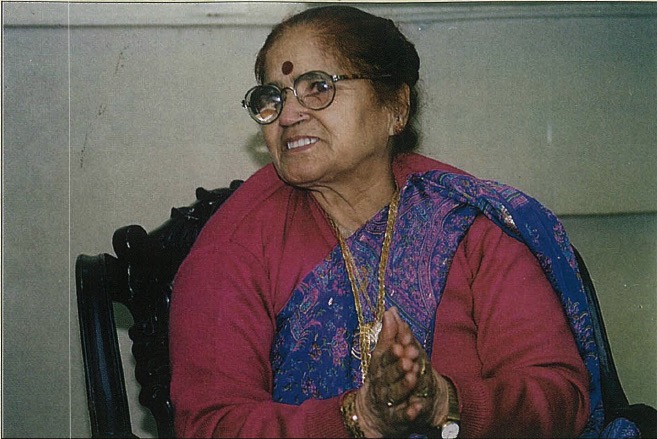From a distance, Shakuntala Arya, 69, looks like an ordinary Punjabi housewife, not at all like the mayor of Delhi–the world’s twenty-first largest city. The Bharatiya Janata Party tapped her for the post based on her years of political involvement, even though she had never actually held office. Deeply religious and hardworking, Mrs. Arya is hailed as an energetic force–her first mission was to clean up Delhi’s streets, possibly the world’s most intimidating piece of housekeeping. To see what makes this unique leader tick, we sent our Hinduism Today correspondent, Rajiv Malik, to interview her in Delhi.
On family religious upbringing
My father belonged to the army, but despite this he never wavered from dharma. We all arose at 4am–even the two-year old. After arising, our whole family performed hatha yoga postures, then participated in yagna, ritual fire worship. Without yagna and a bath, no breakfast was allowed. Father took us to Arya Samaj religious gatherings, and to meetings addressed by prominent saints. Listening was not enough–after returning home my father had us repeat it in writing.
On her daily morning schedule
I still arise at 4am, the Brahma Muhurta period. The Rig Veda says that prana vayu–the vital, life-giving energy of the air–flows at this time. Those who inhale this prana remain healthy and blissful, while those whose doors are closed and faces covered with blankets are deprived of it. I work on writing books for awhile, perform 25 yoga postures, yagna and only then take breakfast. After breakfast, my time belongs completely to the people.
On her role as mayor
My first priority is to attend religious functions, then political. Even while performing mayoral duties, I never miss daily fire worship, whether traveling on the train or abroad. One time while in another country, in the hotel I performed yagna, and due to the smoke, sirens started wailing. It was a panic! The hotel staff ran in. I explained everything to them. I pointed to the vessel in which yagna is performed, which is part of my travel kit, and from which the smoke was emanating. The staff left smiling.
On corruption
Those of us who talk of removing corruption from public life must first remove it from our own life. We must see where we personally stand in this matter. For instance, we five people who are present [for this interview] must today pledge to never accept or give bribes. Even not offering bribes is a brave move in today’s times.
On abuse of women and children
Before becoming mayor, I was president of a body for the struggle of women’s rights. In many cases we found that the wife herself was exploiting her husband. I feel that if women are being exploited, the responsibility for this also lies in themselves. Regarding children, today parents encourage and feel proud when their young children sing obscene film songs and emulate film actors and actresses. But what looks like a blessing at this point becomes a curse later in life. We must encourage and inspire our girls to become like Rhani, the noble Queen of Jhansi. But unfortunately we encourage them to emulate films stars like Madhuri Dixit. I feel the mother is to be blamed for this. Mother is the first guru of the child and can transform her completely.
On her message to youth
Youth have the capacity to get things done. You can realize your golden dreams. Wherever you go, in whatever sphere you work, you can bring about a revolution, because your blood is hot, your youth is full of enthusiasm. Youth must pledge to not give or take dowry. The girl must also say she will not marry someone who is interested in dowry. Secondly, youth must always keep the religious viewpoint. When I visit other countries, I tell Hindu youth to never forget their Indian culture and Hindu roots. Remember that ultimately it is our Indian culture which will see us through life. Running after Western culture will not take us anywhere. It is like the deer who looks for the good smell outside himself, whereas it is coming from his own stomach. Today Westerners come to India with much interest, as they are fed up with materialism.
On systems of family
I prefer the joint family system. Grandparents living in the home will shower the grandchildren with love and affection, familiarize them with our ancient, rich culture, and look after their health and character, all of which will lead to better development of the children. When both the parents are working, they cannot give due time and attention to the kids.
On Indian women
Indian women are sacrifice and penance personified. Their shyness is accepted as a virtue the world over. They are deeply religious. And they keep away from sinful actions. They make many sacrifices for their children, husband and society.
On Hinduism
Someone who believes in God is as much a Hindu as someone who doesn’t. Hinduism is so liberal. But I treat only that individual as a Hindu who loves his own culture, who loves every particle of the earth to which he belongs, where he was born. He must treat all the rivers of this country, Ganga, Yamuna and Saraswati, as his mothers. He does not even want to crush an ant.1Ú4


